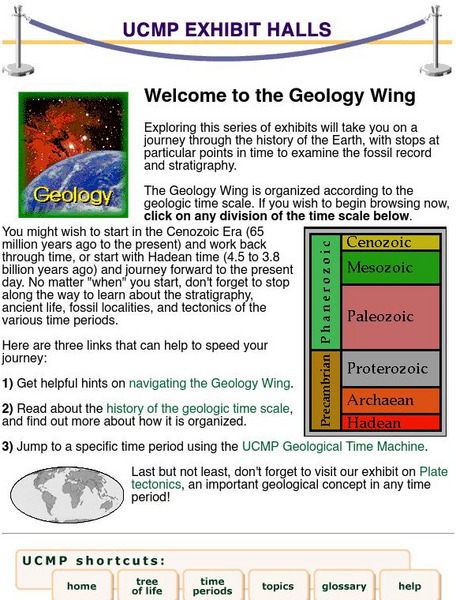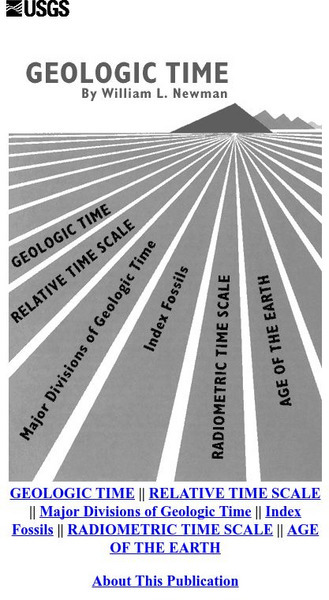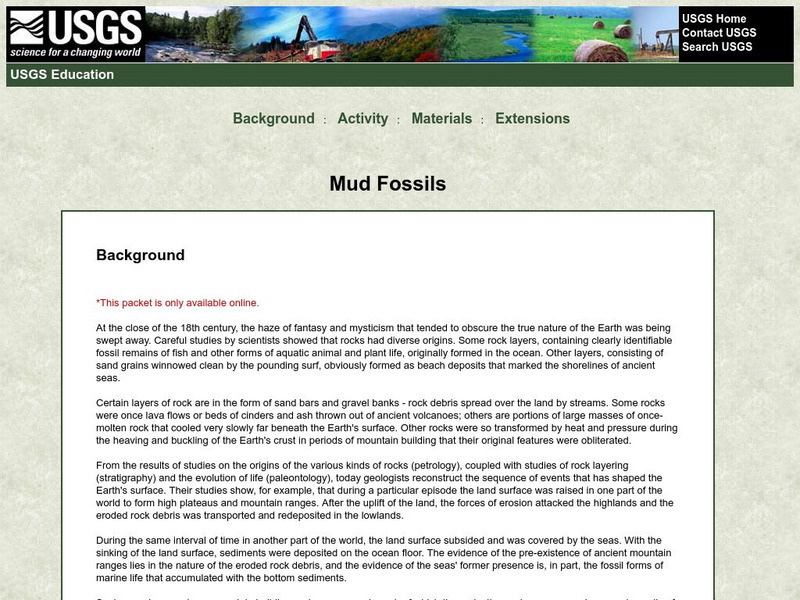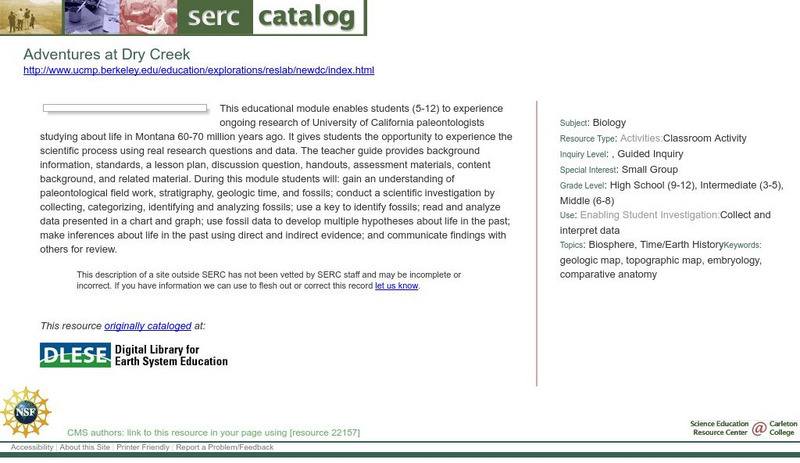Hi, what do you want to do?
Curated OER
Date a Rock!
Students figure the number of half-lives since the sample solidified, and therefore the "age" of the sample rocks.
Curated OER
The End of an Era
Students explore the American-Mongolian paleontology expedition of Cretaceous fossil beds at Ukhaa Tolgod in the Gobi Desert. They present information about the life forms, tectonics, climate and geology of this time.
Curated OER
Tooth Detectives: Determining the Diets of Extinct Animals
Students study the teeth of living mammals and apply those skills to the interpretation of the diet of extinct animals.
Curated OER
Plate Tectonics: Recycling the Seafloor
Students classify earth's layers and plates using Ocean Seismicity data. In this plate tectonics lesson, students outline where the plate boundaries are on the world map. They then compare these predicted boundaries with USGS map of the...
Curated OER
Searching the Digital Atlas
Students become familiar with the tools of a digital atlas. They use a digital atlas of Idaho to located specified information. Students identify national forests, locate butterfly families, find examples of resident fish, and explore...
Curated OER
Natural Hazards
Young scholars evaluate the hazards of naturally occurring events. After watching a video concerning safety hazards, students work in groups to discuss the safety issues involved in taking a trip to a mountainous region. ...
Curated OER
Pass the Plate
Young scholars define constructive forces. They describe how landforms are created as a result of constructive forces. Students recognize active volcano areas in the United States. They demonstrate an understanding of Panagea.
Georgia Department of Education
Ga Virtual Learning: Geologic Time and Correlation
In this amazing interactive tutorial you will learn about what methods are used by geologists to learn about the history of the Earth. Investigate a geologic time scale and learn about how scientists have developed and organized a record...
Other
Western Oregon University: Earth System Science: Geologic Time [Pdf]
An 81-page slideshow that looks at the principles of geology with respect to relative dating, at different concepts describing geological processes, at absolute age and radiometric dating, at the eons and eras in the geologic time scale,...
Science Education Resource Center at Carleton College
Serc: Investigating the Geologic Time Scale: Trends in Geologic Time
In this Earth Science indoor laboratory inquiry, students will create their own geologic time scale based on observation of teacher supplied, historically correct fossil data and also relevant rock samples with the age of the rock sample...
US Geological Survey
U.s. Geological Survey: Geologic Time
A discussion of geologic time, how scientists use the concept, and how they have determined its span.
University of California
University of California Museum of Paleontology: Geology and Geologic Time
This site provides information about the geologic relationships of rock layers, as well as much about geologic time and the history of Earth.
Talk Origins Archive
Talk Origins Archive: Radiometric Dating and the Geological Time Scale
A lengthy article with lots of information about radiometric dating, including pictures and charts.
US Geological Survey
Usgs: Geologic Time
This large U.S. Geological Survey site offers a look at the age of the earth, how radiometric dating is used to calculate it, the major divisions of geologic time, and the classification and use of fossils.
University of Oxford (UK)
Oxford University Museum of Natural History: The Learning Zone: Fossils
This excellent website walks students through the basics of understanding fossils. It emphasizes that most common fossils would be invertebrates and, after learning more about these life forms, students can choose to take a quiz. The...
American Geosciences Institute
American Geosciences Institute: Earth Science Week: Mud Fossils
In this lesson plan students will look at the major divisions of geologic time and learn about the fossils and forms of life which existed during those periods, helping them to understand how the age of rocks are preserved.
Other
Virtual Fossil Museum: Fossils Across Geological Time and Evolution
Learn about fossils throughout geological time. Includes images of different types of fossils.
US Geological Survey
U.s. Geological Survey: Fossils, Rocks, and Time
Publication delves into the importance of studying the Earth's history and how we go about doing it. View pictures and diagrams showing the geological time scale and fossil succession.
US Geological Survey
U.s. Geological Survey: Mud Fossils
Two part lesson allows for students to observe real fossils then make and recover their own fossils using mud.
University of California
University of California Museum of Paleontology: Stories From the Fossil Record
This colorful, interactive site demonstrates how fossils can be used to discover a range of information about the past. Topics include Past Lives, Paleoecology, Geologic History, and Biodiversity.
Georgia Department of Education
Ga Virtual Learning: Historical Geology
In this interactive tutorial you will explore how geologists use clues in rocks to determine the order in which rocks formed. Learn how principles of radioactivity are used to assign actual ages to rocks. Students will explore fossils...
Other
Planetary Society: Relative and Absolute Ages in Histories of Earth and the Moon
A lengthy scholarly article that discusses the geologic time scale, its history of development, age-dating events that occurred in different eras, and how absolute and relative dating are used to assess the ages of the Earth and Moon....
Smithsonian Institution
National Museum of Natural History: Paleobiology: Geologic Time: Hadean Eon
Journey into the past while reading this comprehensive overview of the Hadean Eon that covers topics such as the formation of the earth, its surface and atmosphere, fossil evidence, erosion and plate tectonics.
Science Education Resource Center at Carleton College
Serc: Adventures at Dry Creek
This educational module enables students (5-12) to experience ongoing research of University of California paleontologists studying about life in Montana 60-70 million years ago. It gives students the opportunity to experience the...













![Western Oregon University: Earth System Science: Geologic Time [Pdf] PPT Western Oregon University: Earth System Science: Geologic Time [Pdf] PPT](https://static.lp.lexp.cloud/images/attachment_defaults/resource/large/FPO-knovation.png)













